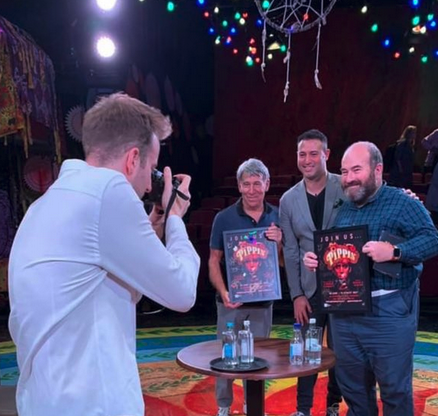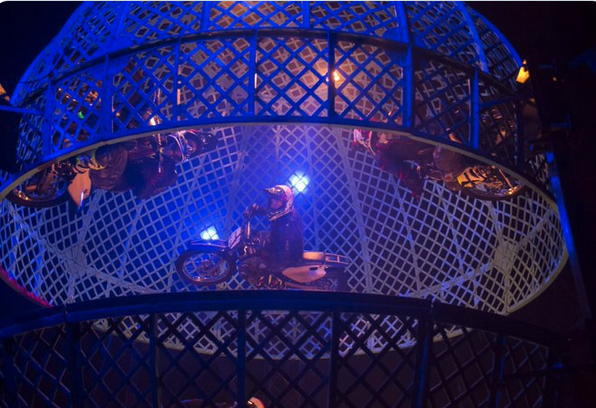Since moving to West Sussex a few months ago, I return to London at least once a week for an overnight stay, in which I usually manage to squeeze in four shows in two days, before departing on the late train on second day.

This week, however, I wasn’t on official reviewing duty for any of them. Which made this a kind of busman’s holiday, though there were ‘work’ elements. On Tuesday evening I saw Pippin at Charing Cross Theatre for the fifth time — and afterwards hosted a Q&A with its composer/lyricist Stephen Schwartz, who was just 22 when its original production premiered on Broadway (where it was directed and choreographed by Bob Fosse). That was 1972; so next year will be this show’s 50th anniversary!
I saw it first around five or six years later, as a young teenager in my native South Africa (and still have the LP of that production’s cast album). So the show has been with me for most of my adult life, and it’s not just the early association with it that makes it so uniquely special to me: it’s a show about suffering from depression as its hero embarks on a journey to try to find meaning in his life, and depression has been a regular companion of mine, too. (I feel I have finally in the last year tackled its causes, and not just dealt with its symptoms).
Steven Dexter’s production makes explicit something that is implicit: that the whole show is being conjured in its title character’s mind, as he wrestles with demons that are trying to urge his suicide. He eventually (spoiler alert) chooses life; and this life-questioning but ultimately life-affirming show is full of stunning melodies, like ‘Corner of the Sky’, ‘Morning Glow’ and ‘I Guess I’ll Miss the Man’ (which was recorded by The Supremes in 1972, which you can watch here)
After the show, producer Adam Blanshay presented Schwartz and myself with a signed poster (pictured below).
Schwartz was en route to Hamburg, Germany, to see the premiere of a ‘non-replica’ production of Wicked there — i.e not a reproduction of the original Broadway and West End productions, both of which resume at their original homes, the Gershwin and Apollo Victoria, in mid-September. It will indeed be wonderful when Glinda tells her audience, “It’s good to see me, isn’t it? No need to respond! That was rhetorical.”

A full transcription of our interview will appear on this site next week.
Linzi Hateley’s amazing return to Joseph and the Amazing Technicolor Dreamcoat
When the current revival of Andrew Lloyd Webber and Tim Rice’s first commercial musical Joseph and the Amazing Technicolor Dreamcoat opened at the London Palladium in 2019, the headline news was the return of Jason Donovan (who played the title role originally and now plays Pharaoh) in the famous 1992 production that turned this pop star into a theatrical one, following a trajectory that had also worked for such names as Cliff Richard and David Essex and continues into this production now with Alexandra Burke as narrator.
But in a casting coup, the most excitement — at least for me — was generated by the announcement that Linzi Hateley, who played the narrator opposite Donovan in 1992, would cover some performances as the Narrator.

Wednesday’s matinee was one of them, and it was joy to see her again. She is still incredibly youthful looking — but also motherly (as befits being a mother herself). She’s punchy, vivacious and hilarious; and has one of the most gloriously pure vocal sounds around. Plus she’s having a ball — and so we do, too!
Cirque Beserk’s return to the West End
I also caught the return of ad hoc circus entertainment Cirque Beserk to the West End on Wednesday evening for a short season at the Garrick to September 11. The show includes the Globe of Death (pictured below), in which three motorbikes whizzing around a very small metal globe, which I previously described when I reviewed the show last in 2016 at the Peacock Theatre as “one of the scariest things I’ve ever seen in a theatre, even more than Lindsay Lohan having appeared in a play in the West End.” I’d now update that to say that it is even scarier than the parade of drag queens that were in the last attraction at this address, Death Drop.

But while a kind of demonic anarchy often prevails, moments of sheer, ecstatic beauty pierce through. This is a show that could become a regular West End “filler” fixture, rushed in to fill a gap in the schedules. One of my favourite parts of it was seeing the silhouette of the glorious Garrick auditorium — and the ghosts of all its past occupants — enjoying this unpredictable show.
Nepotism in the theatre
In a powerful letter to the editor of The Stage, freelance theatre director Josh Roche put his head above the parapet admirably to ask aloud the uncomfortable question that should have been asked before by people further up the food chain than he is — given how much he has to lose, it is amazing that he’s spoken out.
As he puts it,
“As a freelance director, I’ve been deeply disappointed in the way the industry at large has responded to the news of Rufus Norris employing his wife, the playwright Tanya Ronder, to write Hex for the National Theatre. Throughout lockdown, I heard many people speak, from lofty heights, about the need to value freelancers and change the way the industry works in the future. To see London’s NT engage in blatant nepotism, without feeling any need to explain itself, has been deeply depressing.
Ronder is an extraordinary writer. She is also a living female writer, a group that has been under-represented at the NT in the past. Any outstanding writer with a string of hit plays should have their work on at the National, especially if they are a living female writer. However, Ronder is also married to the artistic director. Therefore she is not eligible to be programmed by him. It is not fair. It is not even close to fair.
All freelancers (myself included) harbour ambitions of working at the National Theatre. So we trust that the people who run the building are judging artists objectively, balancing which voices need to be heard alongside the qualities that are needed for NT-worthy work. Hex makes a mockery of this. Are we supposed to believe Norris is capable of objectivity when employing his wife? Are any of us objective about the people we are in love with?”
As drama education specialist Matthew Nichols tweeted in reply, and I added in turn,
Nepotism flourishes freely and completely unchallenged in the theatre industry. It’s one thing when it happens in the commercial sector, where of course producers are free to dispense their favours to whoever they wish, so no one blinks, for instance, when Cameron Mackintosh employs his long-term partner Michael Le Poer Trench as his principal production photographer.
But publicly funded theatres have to be accountable for every penny they spend. And even if Tanya Ronder was indeed the best person for the job, as one must assume she was determined to be out of all the writers working in Britain today, that should have disqualified her; at a fraught moment in theatre’s recovery, optics are everything, and when so many writers and creatives have had no employment at all, she’s simply the wrong person to be given this opportunity at this time.
